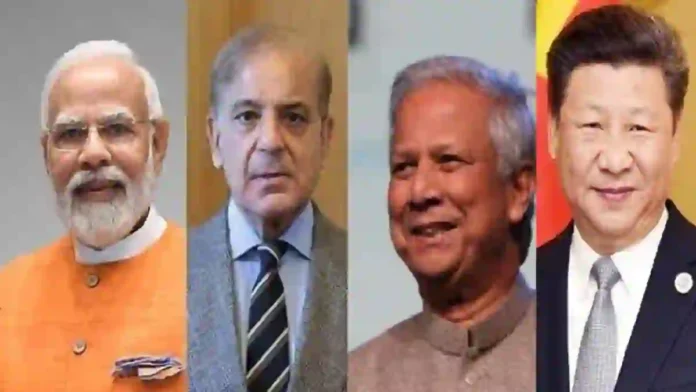China’s debt diplomacy has created a significant strategic challenge for India, as Beijing’s expanding influence over both Pakistan and Bangladesh is reshaping the geopolitical landscape in South Asia. This convergence, recently highlighted by Chief of Defence Staff General Anil Chauhan, is driven by China’s use of loans and infrastructure investments to entrench itself in the region, particularly as both Pakistan and Bangladesh face mounting economic and political instability.
Pakistan has long been dependent on Chinese loans and military hardware, with over 80% of its military equipment sourced from China. The country’s debt repayments to China are projected by the World Bank to stretch over 40 years, effectively making Pakistan heavily reliant on Beijing’s financial and strategic support.
Read- Indian Army conducts surgical strikes on ULFA-I and NSCN-K camps in Myanmar
This dependency has allowed China to exert considerable influence over Pakistan’s domestic and foreign policy, turning it into what some analysts describe as a “vassal state”.
Bangladesh, meanwhile, is showing signs of falling into a similar pattern, especially following the ouster of Prime Minister Sheikh Hasina in August 2024. The interim government led by Muhammad Yunus has demonstrated a willingness to align more closely with China, seeking significant loans to stabilise its faltering economy.
China’s loans to Bangladesh, estimated at $6.1 billion for Belt and Road Initiative (BRI) projects such as the Padma Bridge and Payra Port, are substantial for a developing economy under stress. In March 2025, China extended $2.1 billion in new loans and agreed to more favourable repayment terms, further deepening Bangladesh’s reliance on Beijing.
This economic vulnerability has not only increased China’s leverage but has also facilitated a growing convergence between Bangladesh and Pakistan. The two countries have resumed direct trade for the first time since 1971, and military cooperation has intensified, as seen in Bangladesh’s participation in the Aman 2025 naval exercise in Karachi and high-level military dialogues between Dhaka and Islamabad. This marks a significant shift from Hasina’s era, when Bangladesh maintained a careful balance between Indian and Chinese interests.
Read- India Fast-Tracks Israeli X-Guard Decoy System For Rafale Jets Amid Regional Security Challenges
Read- India’s ‘Destroyer on Wheels’: The Revolutionary Truck-Mounted Howitzer System
The strategic implications for India are profound. The alignment of interests between China, Pakistan, and Bangladesh—now possibly joined by Turkey, which is deepening its defence engagement with Bangladesh—creates a potential axis that could challenge India’s security and regional influence. Turkey’s outreach includes defence industrial cooperation and humanitarian aid, adding another layer to the evolving nexus.
General Chauhan has warned that the economic distress in these neighbouring countries has enabled “outside powers” to exploit vulnerabilities through debt diplomacy, undermining sovereignty and creating strategic dependencies that could destabilise India’s security environment. The inactivity of traditional regional groupings like SAARC, and the emergence of alternative forums led by China, further marginalise India’s role in shaping South Asian affairs.
China’s debt diplomacy is enabling a convergence of interests between Pakistan and Bangladesh that is increasingly aligned against India’s strategic interests. This development, compounded by Turkey’s involvement, presents New Delhi with complex diplomatic and security challenges on both its western and eastern fronts, demanding a recalibration of India’s regional strategy.
Based On India Today Report
Agencies




